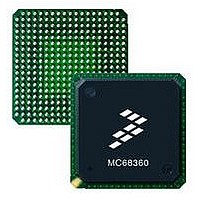MC68EN360CAI25L Freescale Semiconductor, MC68EN360CAI25L Datasheet - Page 698

MC68EN360CAI25L
Manufacturer Part Number
MC68EN360CAI25L
Description
IC MPU QUICC 25MHZ 240-FQFP
Manufacturer
Freescale Semiconductor
Series
MC68000r
Datasheets
1.MC68EN302AG20BT.pdf
(8 pages)
2.MC68EN360VR25L.pdf
(14 pages)
3.MC68EN360VR25L.pdf
(2 pages)
4.MC68EN360CAI25L.pdf
(962 pages)
Specifications of MC68EN360CAI25L
Processor Type
M683xx 32-Bit
Speed
25MHz
Voltage
5V
Mounting Type
Surface Mount
Package / Case
240-FQFP
Core Size
32 Bit
Cpu Speed
25MHz
Embedded Interface Type
SCP, TDM
Digital Ic Case Style
FQFP
No. Of Pins
240
Supply Voltage Range
4.75V To 5.25V
Rohs Compliant
Yes
Family Name
M68xxx
Device Core
ColdFire
Device Core Size
32b
Frequency (max)
25MHz
Instruction Set Architecture
RISC
Supply Voltage 1 (typ)
5V
Operating Supply Voltage (max)
5.25V
Operating Supply Voltage (min)
4.75V
Operating Temp Range
-40C to 85C
Operating Temperature Classification
Industrial
Mounting
Surface Mount
Pin Count
240
Package Type
FQFP
Lead Free Status / RoHS Status
Lead free / RoHS Compliant
Features
-
Lead Free Status / Rohs Status
Compliant
Available stocks
Company
Part Number
Manufacturer
Quantity
Price
Company:
Part Number:
MC68EN360CAI25L
Manufacturer:
APLHA
Quantity:
12 000
Company:
Part Number:
MC68EN360CAI25L
Manufacturer:
Freescale Semiconductor
Quantity:
10 000
Part Number:
MC68EN360CAI25L
Manufacturer:
FREESCALE
Quantity:
20 000
- MC68EN302AG20BT PDF datasheet
- MC68EN360VR25L PDF datasheet #2
- MC68EN360VR25L PDF datasheet #3
- MC68EN360CAI25L PDF datasheet #4
- Current page: 698 of 962
- Download datasheet (4Mb)
Freescale Semiconductor, Inc.
CPM Interrupt Controller (CPIC)
The CPIC prioritizes all interrupt sources based upon their assigned priority level. The high-
est priority interrupt request is presented to the CPU32+ core for servicing. After the vector
number corresponding to this interrupt is passed to the CPU32+ core during an interrupt
acknowledge cycle, that interrupt request is cleared. If there are remaining interrupt
requests, they are then prioritized, and another interrupt request may be presented to the
CPU32+ core.
The 3-bit mask in the CPU32+ status register ensures that a subsequent interrupt request
at a higher interrupt priority level will suspend handling of a lower priority interrupt. The mask
indicates the current processor priority, and interrupts are inhibited for all priority levels less
than or equal to the current processor priority.
The CISR and the mask register in the CPU32+ core can be used together to allow a higher
priority interrupt within the same interrupt level to be presented to the CPU32+ core before
the servicing of a lower priority interrupt is completed. Each bit in the CISR corresponds to
a CPM interrupt source. During an interrupt acknowledge cycle for a CPM interrupt, the in-
service bit in the CISR is set by the CPIC for that interrupt source. The setting of the bit pre-
vents any subsequent CPM interrupt requests at this priority level or lower (within the CPIC
interrupt table), until the servicing of the current interrupt has completed and the in-service
bit is cleared by the user. (Pending interrupts for these sources are still set in the CPIC dur-
ing this time).
Thus, in the interrupt service routine for the CPM interrupts, the user can lower the core’s
mask to the next lower level (the level being serviced minus 1) to allow higher priority inter-
rupts within this level to generate an interrupt request. This capability provides nesting of
interrupt requests for CPM interrupt level sources in a similar manner as the CPU32+ core’s
interrupt mask provides nesting of interrupt requests for the seven interrupt priority levels.
7.15.3 Masking Interrupt Sources in the CPM
By programming the CPM interrupt mask register (CIMR), the user may mask the CPM inter-
rupts to prevent an interrupt request to the CPU32+ core. Each bit in the CIMR corresponds
to one of the CPM interrupt sources. To enable an interrupt, write a one to the corresponding
CIMR bit.
When a masked CPM interrupt source has a pending interrupt request, the corresponding
bit in the CIPR is still set, even though the interrupt is not generated to the CPU32+ core. By
masking all interrupt sources in the CIMR, the user may implement a polling interrupt ser-
vicing scheme for the CPM interrupts.
When a CPM interrupt source has multiple interrupting events, the user can individually
mask these events by programming a mask register within that block. Table 7-22 indicates
the interrupt sources that have multiple interrupting events. Figure 7-100 shows an example
of how the masking occurs, using an SCC as an example.
7-374
MC68360 USER’S MANUAL
For More Information On This Product,
Go to: www.freescale.com
Related parts for MC68EN360CAI25L
Image
Part Number
Description
Manufacturer
Datasheet
Request
R
Part Number:
Description:
Manufacturer:
Freescale Semiconductor, Inc
Datasheet:
Part Number:
Description:
Manufacturer:
Freescale Semiconductor, Inc
Datasheet:
Part Number:
Description:
Manufacturer:
Freescale Semiconductor, Inc
Datasheet:
Part Number:
Description:
Manufacturer:
Freescale Semiconductor, Inc
Datasheet:
Part Number:
Description:
Manufacturer:
Freescale Semiconductor, Inc
Datasheet:
Part Number:
Description:
Manufacturer:
Freescale Semiconductor, Inc
Datasheet:
Part Number:
Description:
Manufacturer:
Freescale Semiconductor, Inc
Datasheet:
Part Number:
Description:
Manufacturer:
Freescale Semiconductor, Inc
Datasheet:
Part Number:
Description:
Manufacturer:
Freescale Semiconductor, Inc
Datasheet:
Part Number:
Description:
Manufacturer:
Freescale Semiconductor, Inc
Datasheet:
Part Number:
Description:
Manufacturer:
Freescale Semiconductor, Inc
Datasheet:
Part Number:
Description:
Manufacturer:
Freescale Semiconductor, Inc
Datasheet:
Part Number:
Description:
Manufacturer:
Freescale Semiconductor, Inc
Datasheet:
Part Number:
Description:
Manufacturer:
Freescale Semiconductor, Inc
Datasheet:
Part Number:
Description:
Manufacturer:
Freescale Semiconductor, Inc
Datasheet:











